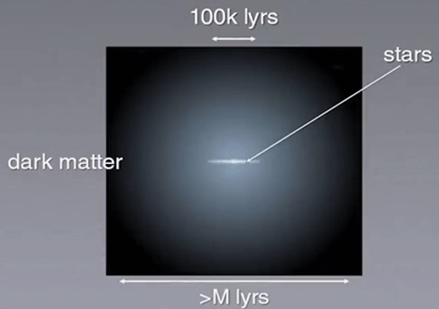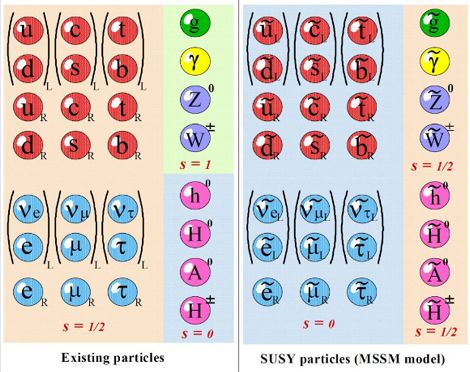11 Dark Matter and Dark Energy
11 Dark Matter and Dark Energy【Exploring the universe】Dialogue with the Universe
11−1 Dark Matter
・Dark matter is matter and energy, which is supposed to describe the structure of the universe and the operation of the galaxy. (Fritz Zwicky in 1934) [1]
・It is named darkness from the fact that is not only not emitting light but also not reflecting.
・Dark matter is distributed spherically around the galaxy.
・From it is to us that can not be only three spatial dimensions recognition, dark matter can not be seen in motion in the other seven spatial dimension to us. [2]
・Mass of dark matter is a kinetic energy of the particles(Elementary particle? In superstring theory, it is string that vibrates at a high frequency) in motion in the other seven spatial dimensions. [2]
・It can be detected by the gravitational lens effect.

※True nature of galaxies [3]
・Neutralino that is the lightest and stable particle in supersymmetric particles is one of the leading candidates for dark matter.
・Neutralino, that is the partner of photon and Z boson or the the Higgs particle, and that is electrically neutral. It's spin is 1/2. So neutralino particles is such as relatives of neutrino.

※Candidate for dark matter [4]
11−2 Dark Energy
・In observation of galaxies and galaxy clusters(Cosmic structure) that have been made in the 1990s, if the space has to be flat, only dark matter was suggested that not be explained only about 25% of the universe mass. If the dark energy compensate about 70% of the remaining, can be explained that the universe is flat.
・The universe(space-time) is expanding at an accelerated pace. The dark matter and substances act as a brake against the expansion of the universe in order to attract each other by gravity. On the other hand, dark energy acts as a repulsive force. ・・・?
・And the universe (space-time) even though continued accelerated expansion, the density of dark energy does not become thin.
・The identity of the dark energy is not known. [5] (Related to the quantum theory of gravity ...?)
11−2−1 The identity of dark energy (hypothesis 1) [7]
• The same kind of energy with vacuum energy which caused inflation in early universe.
・In that case, dark energy does not change it’s density of energy even the universe continues to expand.
Then, regardless of whether the curvature of the universe is either positive or zero or negative, the universe will dilute and spread without limit.
• On the other hand, it is thought that the dark energy causes phase transition and the energy density will be substantially zero.
(In the inflation of early universe, the vacuum energy density became almost zero by the phase transition of vacuum, as a result, accelerated expansion had stopped.)
• In this case, when the curvature of the universe is positive, the universe is likely to turn to contraction from expansion.
11−2−2 The identity of dark energy (hypothesis 2) [7] [8]
・Phantom energy is a hypothetical form of dark energy that is even more potent than the cosmological constant at increasing the expansion of the universe
・If it exists, it could cause the expansion of the universe to accelerate so quickly that a scenario known as the Big Rip would occur.
11−2−3 The identity of dark energy (hypothesis 3) [7]
・In this case, vacuum energy which caused inflation in early universe is left in the current of the universe.
・However, compared to the energy value of the vacuum that should remain theoretically, the value of dark energy observed even smaller 120 digits.
・This problem happens in order to the energy of the vacuum has a feature that "the energy density is constant" . If the density is constant, the amount of energy of the vacuum is rapidly increases with the cosmic expansion.
・So, a theory appeared. In this theory, the identity of dark energy is the unknown energy which is similar to the vacuum-energy, energy density is decreased with the lapse of time.・・・?
- This unknown-energy was named "Quinntessen (fifth element)".
11−2−4 The identity of dark energy (hypothesis 4) [7]
・In this case, dark energy does not exist. (p.208)
・In order to general relativity coming a little change in large scale, such as several hundreds of million light-years or several billion light-years, the universe accelerates expansion.
11−3 Observation
・There is attempt to observe dark matter or dark energy.
11−3−1 XMASS
・The XMASS collaboration, led by Yoichiro Suzuki at the Kavli IPMU, has reported its latest results on the search for warm dark matter. Their results rule out the possibility that super-weakly interacting massive bosonic particles (bosonic super-WIMPs) constitute all dark matter in the universe. [9]
11−3−2 International Linear Collider(ILC)[6]
・The design and associated R&D activities associated with the International Linear Collider (ILC) are performed by a global collaboration consisting of working group and national laboratories in Europe, the Americas and Asia.
・It is possible to explore the identity of the Higgs boson and dark matter and dark energy by the ILC.
• Linear accelerator of approximately 31 kilometres to hit electron and positron

・A site-specific one located in the Kitakami highland in the Iwate prefecture in northern Japan.(2013)
11−3−3 Subaru Measurement of Images and Redshifts
・SuMIRe (Subaru Measurement of Images and Redshifts) is a project to reveal the origin and fate of the Universe by elucidating the nature of dark matter and dark energy via imaging and spectroscopy. [10]
【Reference】
1. Why dark matter is assumed?
1) By the third law of Kepler, from the orbital period and the semi-major axis of the two stars we can obtain the sum of the mass of the stars.
M=a^3/p^2
M:Sum of the mass of stars(solar mass)
p:Orbital period(year)
a:Semi-major axis of two stars(astronomical unit: au)
2)When estimating the total mass of galaxies, based on the movement of the galaxy its periphery, the result is a few hundred times the mass which is estimated based on the total luminance of galaxies and the number of galaxies observed optically.
3)Therefore, it is assumed that there are substances that are not visible.
2. 「宇宙は何でできているのか」村山 斉(Japanese)
3. Hitoshi Murayama “From the Big Bang to Dark Energy” Coursera of The University of Tokyo
4. Dennis SILVERMAN”More About Supersymmetry”
http://sites.uci.edu/energyobserver/2012/12/02/update-on-some-higgs-blog-entries/
5.Dark Energy, Dark Matter - NASA Science - Science@NASA
6. International Linear Collider
https://www.linearcollider.org/
7.No.87 Future of the Universe
8. Wikipedia:Phantom energy
9. The Kavli Fundation/Recent News
http://www.kavlifoundation.org/kavli-news/warm-dark-matter-search-using-xmass#.Vhs84eztlBc
10. SuMIRe Project
http://sumire.ipmu.jp/en/category/outline-of-research-en/